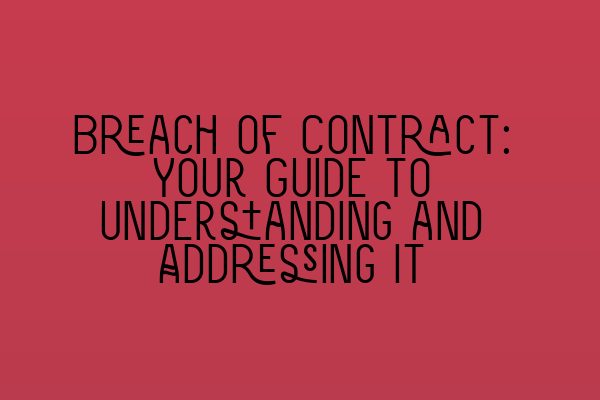Introduction
Breach of contract is a common issue that can arise in various business transactions and agreements. Understanding what constitutes a breach of contract and how to address it is crucial for business owners and individuals alike. In this comprehensive guide, we will delve into the various aspects of breach of contract, its implications, and the steps you can take to address it effectively.
What is a Breach of Contract?
A breach of contract occurs when one party fails to fulfill its obligations as outlined in a legally binding agreement. This can include non-performance, late performance, or substandard performance of the agreed-upon terms. A breach can occur in any type of contract, whether it’s a business contract, employment agreement, or a contract for services.
Types of Breach
There are different types of breaches, each with its own implications. The three main types are:
1. Material Breach: This type of breach is a serious violation that goes to the root of the contract. It typically involves a failure to perform a major obligation or a breach that substantially affects the overall purpose of the contract.
2. Minor Breach: A minor breach occurs when a party fails to perform a relatively insignificant aspect of the contract. While it doesn’t undermine the overall purpose of the agreement, it can still entitle the non-breaching party to seek damages.
3. Anticipatory Breach: Also known as a repudiation, an anticipatory breach occurs when one party clearly indicates that they will not perform their obligations under the contract. This type of breach often occurs before the agreed-upon performance date and gives the non-breaching party the right to terminate the contract and seek damages.
Steps to Addressing a Breach of Contract
Addressing a breach of contract requires a strategic approach. Here are the key steps to follow:
1. Review the Contract: Start by carefully reviewing the terms and conditions of the contract. Identify the specific obligations of each party, the timeline for performance, and any remedies or dispute resolution mechanisms outlined in the agreement.
2. Document the Breach: Maintain a detailed record of the breach, including dates, communications, and any relevant evidence. This documentation will be crucial in supporting your claim later on.
3. Communicate with the Breaching Party: Reach out to the other party to discuss the breach. Express your concerns and attempt to resolve the issue amicably. If possible, explore alternative solutions or negotiate a new agreement.
4. Seek Mediation or Arbitration: If informal negotiations fail, consider engaging in mediation or arbitration. These alternative dispute resolution methods can help facilitate a resolution without the need for costly and time-consuming court proceedings. Our article on SQE 1 Practice Mocks FLK1 FLK2 can provide you with insights on dispute resolution techniques.
5. Consider Legal Action: If all else fails, you may need to take legal action to enforce your rights under the contract. Consult with an experienced contract law solicitor to assess your case and determine the best course of action. Our SQE 1 Preparation Courses can equip you with the necessary knowledge to understand contract law principles.
Implications of Breach of Contract
The implications of a breach of contract can vary depending on the circumstances. Here are the common consequences:
1. Damages: The non-breaching party may be entitled to claim damages to compensate for any losses incurred as a result of the breach. These damages can be compensatory (to cover actual losses), consequential (to cover indirect losses), or liquidated (pre-determined amounts agreed upon in the contract).
2. Specific Performance: In certain cases, the court may order the breaching party to fulfill their obligations under the contract. This is known as specific performance and is typically granted when monetary damages are inadequate to remedy the harm caused by the breach.
3. Termination of the Contract: A breach of contract can provide grounds for terminating the agreement. This allows the non-breaching party to walk away from the contract and seek compensation for any losses incurred.
Conclusion
Understanding the complexities of breach of contract is essential in safeguarding your rights and interests. By familiarizing yourself with the different types of breaches, the appropriate steps to address them, and the potential consequences, you can navigate through contract disputes with confidence. Remember, seeking professional legal advice is critical in ensuring you take the right course of action. Our SQE 2 Preparation Courses can further enhance your legal knowledge and assist you in mastering contract law. Stay informed, be prepared, and protect yourself from breaches of contract.
